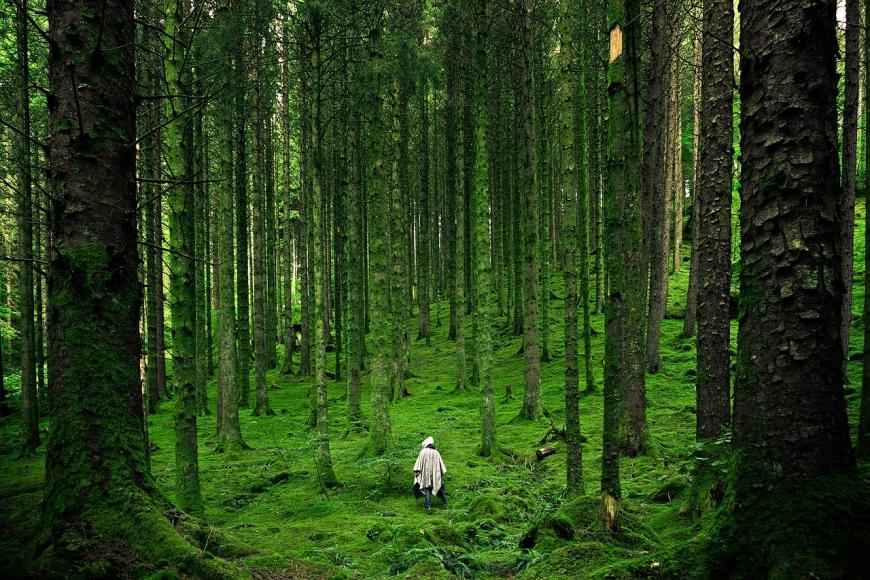
08 May Japanese Forest Bathing
Have you ever heard of it? To be quite frank, we could also call this practice, “spending time wandering around in nature.” This health-boosting practice involves less hiking and more meandering, observing, appreciating, listening, meditating, and getting in touch with the beautiful outdoors. Forest bathing is more of a general immersion into the forest, retreating from the business and hectic energy of the city.
Forest bathing (a shortened version of the nature solo we do during the Wisdom Quest) is less about hiking up mountains and arriving at the top sweating and short of breath, and more about allowing the peaceful energy of the forest to re-enter your body and soul.
Alison Aubrey from NPR went into nature for a forest bath guided a woman who is certified as a forest therapy guide through the Association of Nature & Forest Therapy, reflecting on her experience on a Morning Edition program. Here is a piece of her story.
“”Close your eyes and just breathe, just breathe,” Choukas-Bradley intoned. It felt a bit like a meditation retreat.
It took me a few minutes to clear out the clutter in my brain, and tune in to the natural world.
“When you open your eyes, imagine you’re seeing the world for the very first time,” Choukas-Bradley told us.
After I opened my eyes, the green looked a lot greener. And I began to see things I hadn’t noticed before: the flutter of birds, the ripple of the water, the swaying of trees.”
(Click here for the full program.)
Her story outlines her experience in nature and explores the scientific backing and studies done behind forest bathing, touching on the Association of Nature and Forest Therapy and their goal of training and certifying about 250 new guides next year (2018-19). Forest bathing also boasts health benefits from increasing immunity and creating of cancer-fighting skills to decreasing inflammation and soothing sore muscles.
One article on the website Mama Natural explains 9 possible benefits of forest bathing:
- Creating kung fu (cancer) fighting killer cells.
- Decreased risk of heart attack.
- Protection against obesity and diabetes.
- More energy and better sleep.
- Mood-boosting effects.
- Decreased inflammation.
- Clearer, more comfortable skin.
- Soothing relief for sore muscles.
- Anti-inflammatory terpenes.
(Want to read a short explanation on each of these benefits? Click here for the article.)
Though people for thousands of years have been retreating into nature to regain mental clarity, wisdom, inspiration, relaxation, and Divine connection, forest bathing became part of Japan’s national public health program in 1982 when the forest ministry promoted topiary as therapy. For 8 years, Japan studied the effects of forest bathing (called “Shinrin-yoku”), coming back with evidence supporting that being in nature does, in fact, have many positive benefits on our physical, emotional, mental, and spiritual health.
One article from Quartz outlines the benefits of Forest bathing, exploring the scientific side of why spending time amongst the trees is beneficial. Below is an excerpt from the post:
“From 2004 to 2012, Japanese officials spent about $4 million dollars studying the physiological and psychological effects of forest bathing, designating 48 therapy trails based on the results. Qing Li, a professor at Nippon Medical School in Tokyo, measured the activity of human natural killer (NK) cells in the immune system before and after exposure to the woods. These cells provide rapid responses to viral-infected cells and respond to tumor formation, and are associated with immune system health and cancer prevention. In a 2009 study Li’s subjects showed significant increases in NK cell activity in the week after a forest visit, and positive effects lasted a month following each weekend in the woods.
This is due to various essential oils, generally called phytoncide, found in wood, plants, and some fruit and vegetables, which trees emit to protect themselves from germs and insects. Forest air doesn’t just feel fresher and better—inhaling phytoncide seems to actually improve immune system function.
Experiments on forest bathing conducted by the Center for Environment, Health and Field Sciences in Japan’s Chiba University measured its physiological effects on 280 subjects in their early 20s. The team measured the subjects’ salivary cortisol (which increases with stress), blood pressure, pulse rate, and heart rate variability during a day in the city and compared those to the same biometrics taken during a day with a 30-minute forest visit. “Forest environments promote lower concentrations of cortisol, lower pulse rate, lower blood pressure, greater parasympathetic nerve activity, and lower sympathetic nerve activity than do city environments,” the study concluded.
In other words, being in nature made subjects, physiologically, less amped. The parasympathetic nerve system controls the body’s rest-and-digest system while the sympathetic nerve system governs fight-or-flight responses. Subjects were more rested and less inclined to stress after a forest bath.”
(read the full article here)
The Japanese have always heeded the wisdom of the environment and respected and deeply admired the beauty of nature, and their culture reflects this knowledge. As humans, we used to live amongst nature, wandering through forests to scavenge and roaming the plains to hunt. We spent all day outside, from dusk to dawn, observing the patterns of the animals, reading the wind and the clouds, watching the sun as it slid gracefully across the sky. Ask yourself this: “When was the last time I spent a full day outside?” The sad truth for most of us is that we can’t remember. We get so stuck in the work mindset that we scarcely feel the breeze on our skin or listen to the rustling leaves on the trees, and instead, spend all day inside behind a computer screen.
Imagine what would happen if everyone started spending more time outside, re-setting our minds and emotional bodies to a state of calmness and child-like wonder. Not only would our physical bodies be healthier, but we would be less depressed, less anxious, less fearful, and less closed-off. Together, we would create a communal uplifting of our energy, bringing us to a collectively higher vibration.
Together, we can create a change. All we need to do is go outside.




Sorry, the comment form is closed at this time.